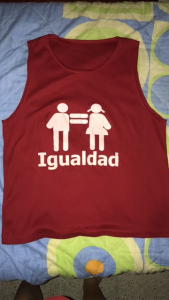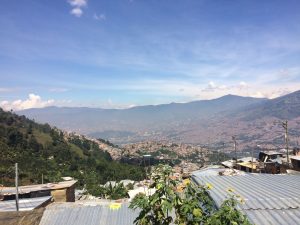In weekly workshops, Global Pathways Colombia students respond to academic articles and reflect on their experiences so far. We are publishing a selection of their reflections on this blog.
Ivy Tran, CU Boulder
•••
Samantha Schecter, Emerson College
I have learned and experienced more in my two weeks in Medellin than I had anticipated. La gente; son amable, generoso, y resistente. Being here has been such a discovery for a part of my identity I had previously neglected. Speaking quietly to it on the phone, undermining its story, shoving it to the side. Shame should not be felt for any part of who you are. You are you, you are growing, you are evolving; always.
The women in Manantiales are strong. Their strength is reminiscent of my mothers’. The strength she exhibited when her husband died leaving her with two small children ages one and three. The strength she exhibited when she left her family and country behind in hopes of a future better than what was available under her circumstances. The strength she exhibited when she brought her drug addicted brother with her so that her family wouldn’t have to endure the pain that comes with seeing a loved one suffer with addiction. The strength she exudes every day.
It’s strange to think that Medellin will soon again be home to my mom in just a few years. I fear she will be lonely. I know she lives and dies for my sister and me. Como me dice, “tu eres mi vida”. And I know that. I have never doubted that.
The more time I spend in Manantiales, the more I realize just how strong these people are. Just how loving and giving every one of them have been. At every home I went to I was offered something. The first woman I interviewed fed me pineapple and gifted me the most beautiful coin purse. Hearing her story of having gone without food and water for some time made these gifts that much more meaningful. True colors show in times of hardship. Feeding a person is more meaningful than people tend to realize; and although I didn’t eat all of what was offered to me in Manantiales, that doesn’t take away from that meaning. The women in Manantiales are giving; Food, love, gifts, trust. With smiles on their faces and undying love in their hearts, they give and give and give. After all that has been taken from them, these people, still, don’t stop giving.
 After the second trip to Manantiales, Eli was wearing a red shirt with the silhouettes of a person wearing pants and of a person wearing a skirt, divided by an equal sign, and the word “igualdad” under it. “Me gusta mucho tu camisa!” I told her. She said she would give me one the next time I came; and she did.
After the second trip to Manantiales, Eli was wearing a red shirt with the silhouettes of a person wearing pants and of a person wearing a skirt, divided by an equal sign, and the word “igualdad” under it. “Me gusta mucho tu camisa!” I told her. She said she would give me one the next time I came; and she did.
I AM SO PRIVILEGED. I have mobility and representation and my voice is heard. I do not fear of displacement. I do not fear of how I will pay next month’s rent. I do not fear that my kids don’t have enough to eat or that they are not receiving a quality education or that they are cold at night or getting wet from the rain leaking through my plastic roof. I don’t have kids for that matter. Or a plastic roof. But many people in Manantiales do. And they don’t think like me. They painfully leave where they are no longer welcome, rebuild homes in another place they are not welcome, and say “p’alante”.
Since being in Colombia and Manantiales I have been thinking a lot about purpose and life. Why do we feel such a profound desire to live? In happiness or misery, luchamos. Por que? I hear these stories and think, “wow. I don’t think I could do it. I don’t think I could go through that and push and fight and slave away at life for a chance at living.” How are these people just as happy as people I know that are living the archetype of a notable, fulfilling life? What I have realized is that it isn’t about what you do in life, it is about the meaning you find in that doing. The purpose of life is finding meaning in your circumstance.
•••
Tucker Treat, CU Boulder
•••
Gabriela Mancuso, Emerson College
 On our very first trip to Manantiales de Paz, amidst the tin roofs, pinks and yellows of weathered wooden homes, and the compact silence found between heavily laden clothes lines, I came across a fuming woman screaming into her cell phone about her boyfriend. She leaned against the side of her home and beat the air with her free arm all while cursing her “novio” and whatever it was he had done to make her so angry. This is the first thing that popped into my mind when Isha suggested I write about “the romance of Medellin” for this reflection.
On our very first trip to Manantiales de Paz, amidst the tin roofs, pinks and yellows of weathered wooden homes, and the compact silence found between heavily laden clothes lines, I came across a fuming woman screaming into her cell phone about her boyfriend. She leaned against the side of her home and beat the air with her free arm all while cursing her “novio” and whatever it was he had done to make her so angry. This is the first thing that popped into my mind when Isha suggested I write about “the romance of Medellin” for this reflection.
I have been fortunate enough to travel to many countries and cities throughout my life, but in no other place have I ever seen a woman so angry with her boyfriend, as I have in Medellin. In this same moment I was struck by the very uncomfortable notion of my own unimportance. I mean, here I am- waking up everyday to go to work on time, studying enough to do well in school, eating well balanced meals, going to the gym, looking both ways before I cross the street, and even recycling- but there is nothing good, and nothing huge throughout the entirety of my 20 years of life that I have done to prevent this woman’s boyfriend from being so shitty.
I was most excited to come to Medellin to experience community. This is why I was surprised when immediately after this feeling of unimportance; I was overcome by the feeling and sense of community and love- just in a new way. We wake up, we go to work, and we do “good” to sustain life. We want to sustain life, because of the people we come to pass it by with- whether it be shitty boyfriends, or our closest friends- these are the people that we love, and want- whether we should or not. Medellin is romantic because it reminded me how to love. The people I have come to pass the time by with have helped me remember the true meaning of life and loving.


